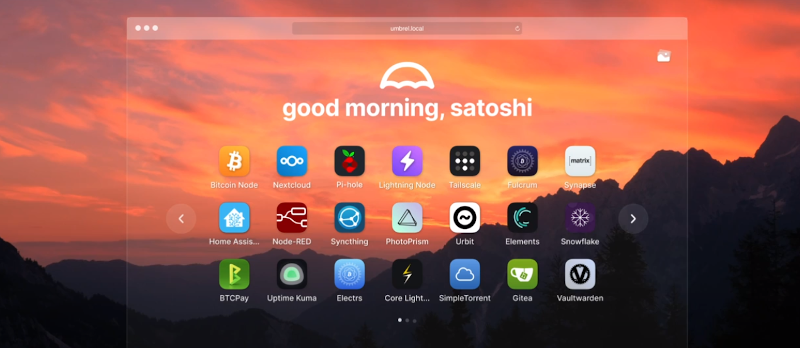While it is undeniable that cloud-based services are handy, there are people who would rather do it themselves. For many of us, it is because we want what we want the way we want it. For others, it is a distrust of leaving your personal data on someone’s server you don’t control. Umbrel is a Linux distribution just for people who want to self-host popular applications like NextCloud or Home Assistant. [ItsFoss] has a good review that points out some of the plusses and minuses of the early version of Umbrel.
What’s really interesting, though, is the approach the distro takes to installing software. Like most modern distributions, Umbrel has a package manager. Unlike most, though, the packages are actually docker containers. So when you install an app, it is preconfigured and lives in its own bubble, unlikely to conflict with other things you might install.
We also like that it has a specific build for a Raspberry Pi, although it will work on other 64-bit hardware and you can even install it within docker on top of your normal operating system. Of course, the docker container concept is also a drawback — at least for now — because it can be difficult to adjust settings inside the container compared to a more conventional install.
It amazes us that hardware has become so capable that it is easier to just duplicate entire operating systems than it is to work out the required dependency interactions. Still, it works, and in most cases, it works well.
If you want to know more about Docker, we’ve covered it a few times in the past. You can even use it for very simple development cases if you like.
















Looks like some useful tools even if one doesn’t go for Umbrel
> difficult to adjust settings inside the container
This is why LXC may be better for such things.
Personally, I like LXD the best. LXD makes it so damn easy to containerize everything I want, but also snapshot, copy, move to another server even on-the-fly, and nowadays LXD does VMs as well — it’s so much better than Dockers or Podmans or the likes!
Agreed, Linux Containers are nice. You can try them live online, there’s even a walk-through tutorial:
https://linuxcontainers.org/
Docker makes it incredibly easy to deploy other peoples projects but building your own Docker images is a really unfriendly process. LXC on the other hand is almost indistinguishable from working on a bare-metal machine and lets you take any project from any source and put it in a container. No goofing around trying to ‘Dockerize’ a project that doesn’t have a pre-made image or waiting for updated images to be released whenever a project gets an upgrade.
I checked it out of curiosity.
But it doesn’t support TLS. The default UI is setup using plain HTTP. The forums say that you’re supposed to use it via TOR. There’s even one community member saying that “if you can’t trust your local network, you shouldn’t be on the internet” :facepalm:
> It amazes us that hardware has become so capable that it is easier to just duplicate entire operating systems than it is to work out the required dependency interactions
That’s the benefit of Docker (Container tech in general) – it’s not really duplicating the whole operating system. It’s more like using the existing OS+any deltas required for the particular container. It’s like an app ‘contained’ within the current OS – chroot’d via LXC so that it has all the isolation but not much of the overhead of a true OS duplication.
Duplicating the entire OS is what VMs do – instead of an ‘app contained/constrained’ within a host OS like containers are, a VM is a big, ugly, entire OS running on top of the host OS with all the inefficiencies and waste that go along with that.
Most of the containers I’ve seen, though, pivot the root and so while the kernel/drivers/devices are the same, they all have their own copies of various libraries. Granted, dedupe on some file systems makes that a little friendlier, but everyone gets their own libc, their own libssl, etc except for cases where something has mapped the system’s version into the container space, no?
Looks interesting so I spun up Debian 11 via qemu and installed ZeroTier then installed Umbrel, that way I don’t need to use TOR, getting to the web interface via ZT works very well and I can move my VM around as much as I like and it should just work, with full control over who can see and access the services on the VM. If I need to expose services to the public I can port forward so long as my firewall is also on the same ZT network. The interface adapts well from a 4K desktop screen to a mid range mobile phone screen and again getting access via ZT is a breeze once that is working on the mobile too. However at this stage Umbrel is very much a crypto focused environment, not that it doesn’t show a lot of promise as a more general solution to netizen autonomy and mobility. Anything is worth a try to free yourself from the control freaks and attention-slavers of Big IT.
Actually I take that back, NextCloud gives you the old “Access through untrusted domain” winge if you try to use it via ZT so some hacking may be required, rather than the convenient two click install that Ubrel is offering. Oh well, teething problems I guess, probably works fine via TOR though…
“Update all” button freaks me out.
I run my bitcoin node on Umbrel and a Raspberry Pi 4. Make sure to update your eeprom! https://youtu.be/GXr0uWpYb9k